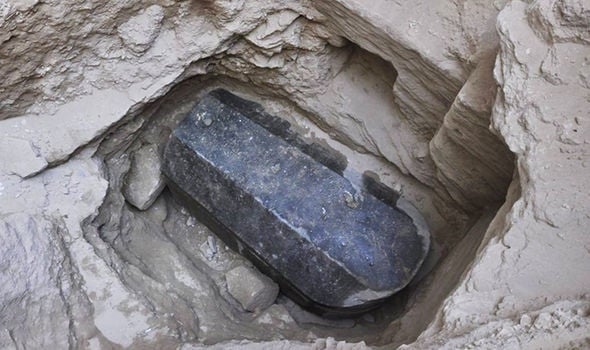
Archaeologists have ignited the world’s imagination with the discovery of a large granite sarcophagus in Egypt. The find is especially intriguing because its mortar seal is completely intact, meaning that tomb raiders and treasure seekers haven’t gotten their hands on it over the centuries, leaving the contents untouched. But does the 2,000-year-old object hold the remains of Alexander the Great?
“I’ve had calls about this all day,” Mostafa Waziri, secretary general of the government’s Supreme Council of Antiquities, told the New York Times. “People are saying it might contain Alexander or Cleopatra or Ramses. They don’t know what they are talking about.”
According to the Egyptian Ministry of Antiquities, the sarcophagus dates to the time of the Ptolemaic dynasty, between 304 and 30 BC, descended from Alexander’s general, Ptolemy I. The approximately nine-by-five-foot sarcophagus weighs some 30 metric tons.
This alabaster head was found alongside a mysterious black granite sarcophagus in Alexandria. Courtesy of the Egyptian Ministry of Antiquities.
The ancient artifact was dug up by construction workers in the port city of Alexandria, where ancient ruins are rarely discovered. Archaeologists took over the excavations, also uncovering the alabaster head of a man, possibly the tomb’s occupant. The sarcophagus, which lacks a written inscription, is located 16 feet underground and is the largest ever found in Alexandria, adding to interest in its potential contents.
“It’s risky to open it directly—we need to prepare,” Ayman Ashmawy, the head of ancient Egyptian artifacts at the ministry, told the Guardian. “It’s difficult to move it intact and open [it] in a museum.”
This mysterious black granite sarcophagus has been found in Alexandria and excavated by the Egyptian Ministry of Antiquities. Courtesy of the Egyptian Ministry of Antiquities.
In lieu of opening the sarcophagus, the ministry may opt to analyze it using x-rays, CT scans, and other non-invasive technology to avoid potential damage. The coffin may contain a nobleman, who would likely still be wearing the garment and jewelry in which he was buried, as well as any funerary objects.
The mysterious sarcophagus could renew interest in the search for Alexander the Great’s final resting place, which has been lost to history. He died in 323 BC at the age of just 32. Though it is highly unlikely, it would be a find-of-the-century level discovery should the sarcophagus prove to hold his remains.